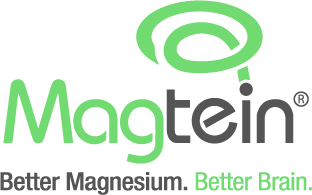Magnesium and Memory: The Connection Between Recall and Cognition
https://magtein.com/wp-content/uploads/2025/11/Screenshot-2025-10-26-at-2.13.07-PM.png 930 522 Riley Forbes Riley Forbes https://secure.gravatar.com/avatar/3f6c9bbe830133d8a02b6d78dd24a6cf57f35765554b3106fa7c0bce0d8772aa?s=96&d=mm&r=gMagnesium is one of the most abundant minerals in the human body, yet its importance for brain health is often underestimated. Beyond supporting muscles, nerves, and energy production, magnesium plays a vital role in the processes that underlie learning, recall, and cognitive performance. Emerging research – particularly on Magtein® (magnesium L-threonate) – suggests that maintaining healthy magnesium levels in the brain may be essential for memory and long-term cognitive resilience.*

Why Magnesium Matters for the Brain
Inside the brain, magnesium supports more than 600 enzymatic reactions, many of which are directly tied to neural activity. It regulates the flow of ions like calcium and glutamate across nerve cells. This helps stabilize communication between neurons and prevents overstimulation.
One of magnesium’s most important functions involves the NMDA (N-methyl-D-aspartate) receptor. This receptor is critical for synaptic plasticity – the brain’s ability to form, strengthen, or weaken neural connections in response to experience. Synaptic plasticity is the foundation of learning and memory formation. When magnesium levels are low, NMDA receptors can become overactive. This overactivity leads to excessive calcium influx and neural stress. Sufficient magnesium helps regulate receptor activity, promoting optimal signal transmission and long-term memory encoding.*
Magnesium also influences neurotransmitters such as GABA (gamma-aminobutyric acid), which supports relaxation and balanced brain wave patterns. This creates the internal environment necessary for focus, recall, and cognitive clarity. Additionally, magnesium modulates AMPA (α-amino-3-hydroxy-5-methyl-4-isoxazolepropionic acid) receptors. AMPA receptors mediate fast excitatory synaptic transmission, which is essential for synaptic plasticity, learning, and short-term memory formation.*
How Magnesium Supports Memory and Learning
Cognitive performance depends on a delicate balance of neuronal excitation and inhibition. Too much stimulation can impair focus, while too little can dull processing speed. Magnesium helps maintain this balance through several key mechanisms:
- Synaptic Density and Plasticity: Magnesium supports the formation and pruning of synapses. This allows neurons to communicate more efficiently. Animal studies show that increasing brain magnesium levels enhances synaptic density in the hippocampus, the brain’s primary memory center.*
- Mitochondrial Function: Magnesium is required for ATP production. This ensures neurons have sufficient energy to transmit and process information.
- Neuroprotection: Adequate magnesium helps buffer oxidative stress and inflammation. Both oxidative stress and inflammation can impair brain performance over time.*
- Cognitive Flexibility: By modulating NMDA and AMPA receptor activity, magnesium supports adaptability. This enhances the ability to shift attention, learn new skills, and store information effectively.*
Together, these mechanisms demonstrate why magnesium is essential not only for momentary mental clarity but also for maintaining cognitive function across the lifespan.
Magtein: A Brain-Focused Form of Magnesium
Most dietary magnesium forms, such as magnesium oxide or citrate, are absorbed into the bloodstream but have limited impact on brain magnesium levels. That’s where Magtein (magnesium L-threonate) stands apart.
Developed by MIT researchers, Magtein combines magnesium with L-threonic acid, a metabolite of vitamin C. This combination helps magnesium cross the blood-brain barrier more effectively. Clinical and preclinical studies suggest that Magtein can significantly increase magnesium concentrations within brain cells, directly influencing synaptic plasticity and memory formation.*
In one landmark study published in Neuron (2010), animals receiving magnesium L-threonate demonstrated improved learning ability, working memory, and short- and long-term recall. Follow-up human research has shown that daily supplementation with 1.5-2 grams of Magtein (providing 108-144 mg of elemental magnesium) can support cognitive clarity and memory retention, particularly in middle-aged and older adults.*

While these findings are promising, it’s important to note that Magtein is not intended to treat or prevent cognitive decline. Instead, it supports the brain’s natural processes involved in memory and attention.*
Lifestyle Synergy: Building a Brain-Healthy Routine
Magnesium works best as part of an integrated approach to brain health. Combining nutrient-rich foods, consistent sleep, and mental engagement creates a foundation for optimal cognition. Consider incorporating:
- Magnesium-rich foods: Spinach, pumpkin seeds, almonds, and legumes provide dietary magnesium that complements supplementation.
- Quality sleep: Deep sleep stages consolidate memories. Consistent rest supports magnesium-dependent neural recovery.
- Cognitive engagement: Learning new skills or engaging in stimulating conversation reinforces neural circuits that magnesium helps sustain.
- Stress management: Mindfulness and exercise can reduce cortisol, supporting magnesium balance and neuroplasticity.*
The Bigger Picture: Magnesium and Nootropic Support
As interest in nootropics – nutrients and compounds that support cognitive performance – continues to grow, magnesium stands out as a foundational element. Its ability to enhance neural communication, stabilize mood, and promote clarity makes it a natural complement to other evidence-based cognitive nutrients.*

Summary
Magnesium is a cornerstone of brain function. It supports energy production, synaptic communication, neuroprotection, and cognitive flexibility. Magtein (magnesium L-threonate) is uniquely designed to raise magnesium levels in the brain. This can enhance learning, memory encoding, and recall. Pairing magnesium with lifestyle strategies – including quality sleep, cognitive engagement, and stress management – supports optimal brain performance, long-term cognitive resilience, and overall neural health. Emerging research continues to clarify magnesium’s role in neuroplasticity, mood regulation, and attention. Altogether, this highlights magnesium’s essential place in a daily brain wellness routine.*
References
- Slutsky I, Abumaria N, Wu LJ, et al. Enhancement of learning and memory by elevating brain magnesium. Neuron. 2010;65(2):165-177. doi:10.1016/j.neuron.2009.12.026
- Zhou X, Huang Z, Zhang J, et al. Chronic Oral Administration of Magnesium-L-Threonate Prevents Oxaliplatin-Induced Memory and Emotional Deficits by Normalization of TNF-α/NF-κB Signaling in Rats. Neurosci Bull. 2021;37(1):55-69. doi:10.1007/s12264-020-00563-x
- Hausenblas HA, Lynch T, Hooper S, Shrestha A, Rosendale D, Gu J. Magnesium-L-threonate improves sleep quality and daytime functioning in adults with self-reported sleep problems: A randomized controlled trial. Sleep Med X. 2024;8:100121. Published 2024 Aug 17. doi:10.1016/j.sleepx.2024.100121
- National Institutes of Health. Magnesium – Fact Sheet for Health Professionals. https://ods.od.nih.gov/factsheets/Magnesium-HealthProfessional/. Accessed 2025.
These statements have not been evaluated by the Food and Drug Administration. This product is not intended to diagnose, treat, cure, or prevent any disease.

